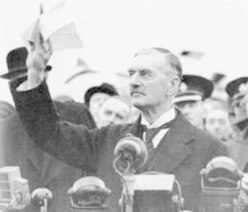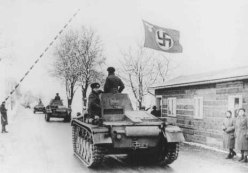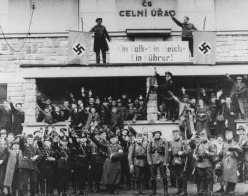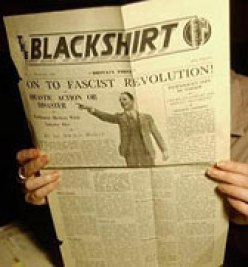“A Far Away Country”
Chamberlain returned to Heston Airport (today Heathrow) waving his famous ‘peace treaty’.
“This morning I had another talk with the German Chancellor, Herr Hitler, and here is the paper which bears his name upon it as well as mine” (waves paper to the crowd – receiving loud cheers and “Hear Hears”) “Some of you, perhaps, have already heard what it contains but I would just like to read it to you”.
Later that day he stood outside Number 10 Downing Street and again read from the document and concluded:
“My good friends, for the second time in our history, a British Prime Minister has returned from Germany bringing peace with honour. I believe it is peace for our time.”
“How horrible, fantastic, incredible it is that we should be digging trenches and trying on gas masks here because of a quarrel in a far-away country between people of whom we know nothing.”
Attacks against Jews increase
On November 9th 1938, German Nazis attacked Jews in their homes, shops and communities across Germany and their occupied territories. This now included the Czech Sudetenland. Here in Opava, North Moravia, Jewish property burns. Some 2,000 people across Central Europe lost their lives.

Germans enter the Sudetenland
As the West abandons the Czechs the Nazi Wehrmacht moves in to the enthusiastic welcome of Sudeten fascists. Czechoslovakia, without her border defences and heavy industry, is now defenceless.
Meanwhile the Poles take Teschen
“Hurrah for the Blackshirts!”
The question of war became entwined with the rise of Fascism. This was both a domestic and International threat. In Britain Sir Oswald Mosley set up the British Union of Fascists, known as the Blackshirts.
Sections of the British ruling class showed their fascist sympathies, with the Daily Mail running a front page with the headline, ‘Hurrah For The Blackshirts’.
The most determined opposition to the Fascists came from within the working class.
Whenever Mosley toured industrial areas he met serious opposition. He was most famously thwarted when he tried to parade through the East End of London by the mass protest at Cable Street in October 1936 despite police attempts to drive a way through.
Many thousands of workers – Jew and Gentile, Irish and English – united under the slogan ‘They Shall Not Pass’.
The non-pacifist left opposed the British Government’s concessions to Germany’s Adolf Hitler and Italy’s Benito Mussolini. Yet the Government saw no reason why it shouldn’t treat the Fascist powers with diplomatic courtesy and accommodate their imperialist demands.
The bombing of densely populated working class areas was first witnessed in Barcelona. Posters with photographs of the dead among the ruins prophetically warned, “If you tolerate this, your children will be next.”
Over a thousand people in Britain volunteered for the International Brigades to fight Franco’s Fascists.






